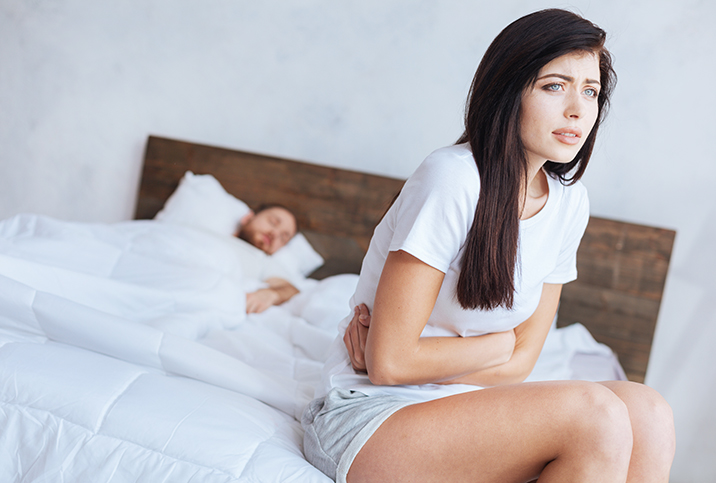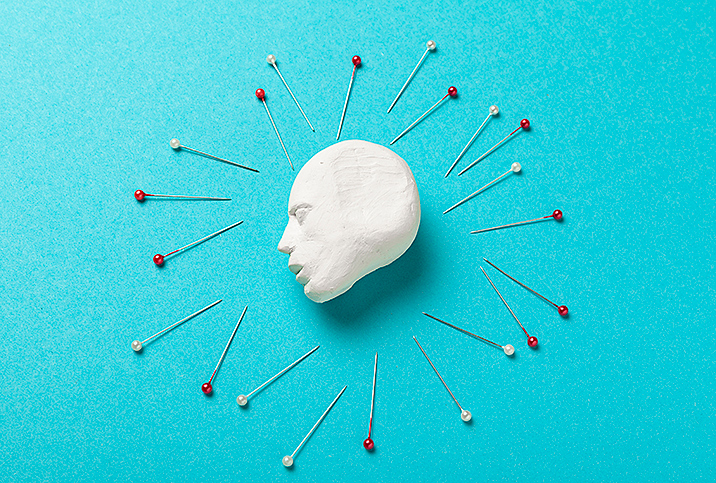Is Postorgasmic Illness Syndrome (POIS) Real? What Is POIS?

Orgasms should be fun. They should be a release. They should make you feel good, not bad. For a select few people, however, orgasms can do the opposite.
What is Postorgasmic Illness Syndrome (POIS)?
Postorgasmic illness syndrome (POIS) is a rare condition in which a person develops flu-like symptoms—some say it's akin to allergies—after orgasm. That includes orgasms with a partner, through masturbation or spontaneously during sleep.
It doesn't sound real, right? But POIS is a genuine condition, according to Justin Houman, M.D., a reproductive urologist and men's health specialist at Tower Urology in Los Angeles and the medical director for Bastion Health, an app-based telehealth platform for men.
It's a real condition, if rare.
"Patients develop flu-like symptoms after an orgasm that last anywhere from a couple of minutes to a few days," explained Houman, adding that the symptoms then go away on their own. "And guys are significantly affected by this."
It mainly affects men, but rare cases of women experiencing it have been documented. POIS can cause significant distress in people with the condition and, in turn, it can impact their partner.
What causes postorgasmic illness syndrome, is it dangerous, and what is its impact on men?
What are the causes of postorgasmic illness syndrome?
It's possible that fewer than 1,000 people in the United States are affected by POIS, according to the Genetic and Rare Diseases Information Center (GARD).
However, James J. Elist, M.D., a urologist in Beverly Hills, California, who specializes in impotence and male sexual dysfunction, said the true prevalence is likely higher because many cases of POIS are not diagnosed or reported.
Symptoms can start as a teenager or an adult, and the more common symptoms of POIS include the following:
- Fatigue
- Weakness
- Headache
- Fever
- Mood changes
- Memory problems
- Concentration problems
- Blocked nose
- Sore throat
- Itchy eyes
"We don't exactly know what causes it," Houman said, before explaining that most clinicians believe it's an allergic reaction or an autoimmune reaction to some of the substances in the man's semen. "Now, different people react in different ways, but that's the underlying theory."
Elist said other clinicians theorize POIS could be caused by:
- Hormonal imbalances
- Neurotransmitter dysfunction
- Infection
- Genetic predisposition
However, more research is needed to determine the true cause of POIS.
What is the impact of POIS?
POIS can greatly affect a person's sex life and sexual health, according to Elist. Men with POIS experience flu-like symptoms, including fatigue, muscle pain and cognitive dysfunction, immediately following an orgasm. The symptoms, which might last several days, can make sexual activity difficult and undesirable.
"As you can imagine, no one likes to develop flu-like symptoms. So when you know an orgasm leads to these symptoms, you're less likely to choose to orgasm," Houman said. "Orgasms are a very pleasurable part of life. And when you're unable to achieve that without negative consent or with negative consequences, it creates significant distress in a man's life."
Therefore, men with POIS are generally less sexually active than men without the syndrome. In addition, Houman said there is a significant amount of depression in this group of men.
"Men with POIS may feel ashamed, guilty or depressed about their condition, which can affect their self-esteem and sexual confidence," Elist explained, adding that support from a therapist or counselor can be beneficial in managing the emotional and psychological effects of the condition.
What is the treatment for POIS?
Without a known cure for POIS, treatment focuses on managing the symptoms. Houman said one coping strategy is to address POIS with a combination of anti-inflammatory medication, antihistamines and medication prior to orgasm.
Other men are able to deal with this situation through planning and timing.
"They know that for upwards of a few days they're going to be feeling ill. So they time their intercourse, orgasms, all that around that idea," Houman said.
Elist explained that treatment options for postorgasmic illness syndrome are limited and not well established, but five strategies that men with POIS may find helpful include:
- Immunotherapy. This treatment involves administering small doses of the semen protein believed to cause the allergic reaction in order to desensitize the body.
- Hormonal therapy. Certain men with POIS have reported improved symptoms with testosterone replacement therapy or other hormonal treatments.
- Medications. Some men with POIS have found relief from symptoms by taking over-the-counter antihistamines or anti-inflammatory medications.
- Lifestyle changes. Getting more sleep and exercise have helped improve symptoms in some men with POIS.
- Support. Joining a support group for men with POIS or speaking with a therapist or counselor can help reduce the condition's emotional and psychological effects.
The lack of POIS treatments approved by the Food and Drug Administration means treatment typically involves trial and error, according to Elist, and working with a healthcare professional to find the best approach for managing symptoms of this illness.
Ultimately, Houman said there is currently no good strategy for long-term prevention.
"We just know how to manage some of the symptoms depending on how bad they are for different patients," he advised.
"It's important to note that POIS is a poorly understood and rare condition, so the best way to cope is to work closely with a qualified healthcare professional," Elist concluded. "They will help you to develop an individualized treatment plan based on your specific needs and symptoms."
Sometimes, broaching a subject as sensitive as an orgasmic disorder can be arduous. And if you don't have a regular physician or therapist, that first step is even more difficult to take. Telehealth can take some of the worry out of a face-to-face encounter.
Video visits, which more physicians and therapists have added as a service, have become a viable option for most people. Giddy telehealth makes it easy to get connected to a qualified healthcare professional who can help with a variety of conditions.


















